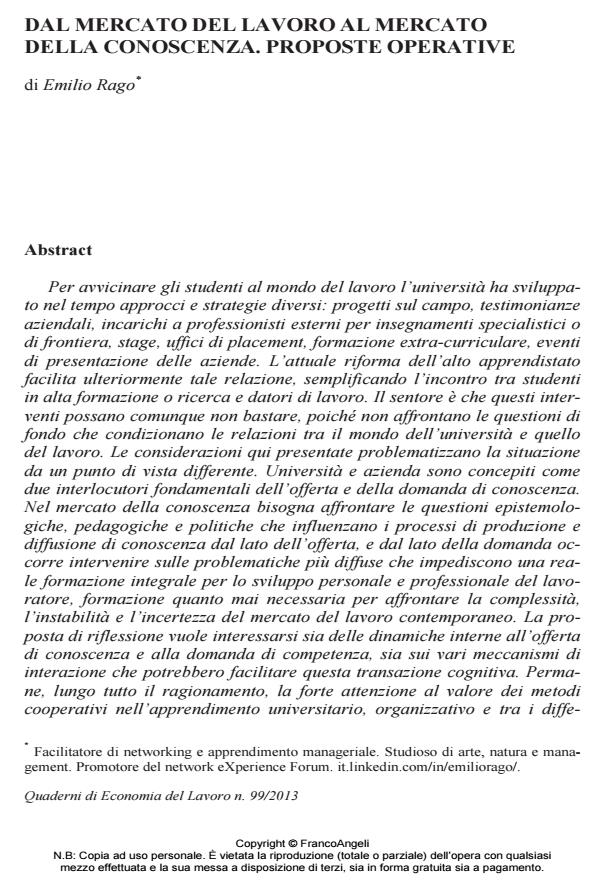Dal mercato del lavoro al mercato della conoscenza. Proposte operative
Journal title QUADERNI DI ECONOMIA DEL LAVORO
Author/s Emilio Rago
Publishing Year 2013 Issue 2013/99
Language Italian Pages 30 P. 119-148 File size 695 KB
DOI 10.3280/QUA2013-099007
DOI is like a bar code for intellectual property: to have more infomation
click here
Below, you can see the article first page
If you want to buy this article in PDF format, you can do it, following the instructions to buy download credits

FrancoAngeli is member of Publishers International Linking Association, Inc (PILA), a not-for-profit association which run the CrossRef service enabling links to and from online scholarly content.
To introduce students to the labour market, universities have developed over time different approaches and strategies: field projects, business testimonials, appointments with external collaborators and professionals for specialized and cutting edge teaching, internships, placement offices, extracurricular training, meetings for businesses presentations. The current reform on High Apprenticeship further facilitates this encounter, simplifying the matching of students, in professional education or research, and employers. The feeling is that these interventions may still not be enough, because they do not actually address the underlying issues affecting the relationship between university and the labour market. The considerations here presented problematize the situation from a different point of view. Universities and companies are accounted as two key stakeholders of supply and demand for knowledge. In the knowledge market you have to deal with the epistemological, pedagogical and political issues that affect the processes of production and dissemination of knowledge on the supply side, whereas on the demand side, you must address the most common problems that prevent a real holistic education for workers’ personal and professional development, more than ever required to deal with the complexity, instability and uncertainty of the contemporary labour market. The proposed reflection takes care of both the internal dynamics of knowledge supply and demand for skills, and the various mechanisms of interaction that could facilitate this cognitive transaction. Throughout this reasoning there persists the strong focus on the value of cooperative methods for academic and organizational learning, and for a useful interaction among different operators of knowledge. The main purpose is the creation of that practical wisdom, the Aristotelian phronesis, which intends to overcome the traditional division between theory and practice in the world of knowledge. Considerations arise in the field of the management sciences, but some implications, mutatis mutandis, can also be applied to other areas of scientific disciplines
Emilio Rago, Dal mercato del lavoro al mercato della conoscenza. Proposte operative in "QUADERNI DI ECONOMIA DEL LAVORO" 99/2013, pp 119-148, DOI: 10.3280/QUA2013-099007